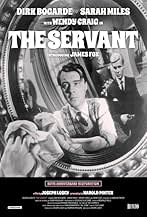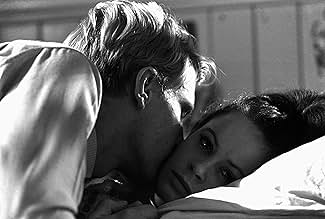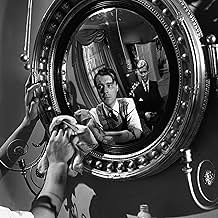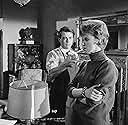PUNTUACIÓN EN IMDb
7,8/10
15 mil
TU PUNTUACIÓN
Tony, de gran fortuna, contrata a Hugo Barrett como criado, que resulta tener ciertos planes ocultos.Tony, de gran fortuna, contrata a Hugo Barrett como criado, que resulta tener ciertos planes ocultos.Tony, de gran fortuna, contrata a Hugo Barrett como criado, que resulta tener ciertos planes ocultos.
- Ganó 3 premios BAFTA
- 8 premios y 11 nominaciones en total
Doris Nolan
- People in restaurant: Older Woman
- (as Doris Knox)
Argumento
¿Sabías que...?
- CuriosidadesWhen producer and director Joseph Losey was hospitalized with a brutal case of pneumonia for two weeks during this shoot, Dirk Bogarde continued filming assisted by minute, daily instructions over the phone from Losey's hospital bed. When Losey returned to the set, he did not re-shoot any of the script, much to the relief of cast and crew. Bogarde managed to keep the film on schedule, though he later said the experience made him determined never to direct.
- PifiasWhen Tony and Susan arrive at Tony's house in the Mercedes, with an extended visit in mind, they both go into the house and Tony leaves the car's lights on.
- Citas
Hugo Barrett: I'll tell you what I am. I'm a gentleman's gentleman, and you're no bloody GENTLEMAN!
- ConexionesFeatured in Stairs (1986)
Reseña destacada
"The Servant" was a film I had to think a lot about. Though I would not consider it as being flawless, it is a very interesting and indeed memorable piece of British cinema.
The characters itself could have been taken from P. G. Wodehouse's hilarious series of comic novels about the perfect butler Jeeves and his 'master' 'Bertie' Wooster, a young, superficial, and careless dandy who could not make one step without Jeeves constantly caring for him.
In "The Servant", a similar relationship is twisted in a much darker way: Hugo Barrett is not at all the faithful servant devoted to his master - though he appears to be at the beginning -, but a scheming, quite evil person who knows very well what he wants. (Though the real motives of his deeds do not become completely clear in the story - but this makes him probably even scarier.)
Dirk Bogarde was just wonderful. Most impressive. His body language, shifting from servile to casual, menacing or frivolous is meticulously developed and executed. The supporting actors were also good, notably James Fox. Sarah Miles tried everything to bring life to her rather cartoonish character, though she never could make me understand how Tony could be so sexually attracted to a woman like her in the first place.
I loved the homoerotic undertones of the Barrett-Tony relationship, especially in the second half of the film, after Barrett's return. They two men often act like a (gay) couple, especially in their disputes. There is also a great piece of dialogue between the two, written in tongue-in-cheek manner by Pinter, when they talk about feeling being "pals" and mention that they have felt like that "in the army before". The loveliest scene was the one where Barrett tells Tony that his "old flame" (Susan) has arrived and then says in a flirtatious manner "one yesterday - and one tonight" while holding Tony's face in his hand. We don't know yet at this point that he has invited some prostitutes, so this remark seems quite ambigous for a moment...
The symbolism is great, the many mirrors in the film forming a substitute for Barrett's gaze, never leaving Tony and Susan. There is also some phallic symbolism (most openly in the long shot of the garden just after the scene when Vera arrives at Tony's house). And Douglas Slocombe's black-and-white photography is just about incredible.
What I liked less about the film was that it was a weird mixture of what is basically a 19th century morality tale, but set in the 1960s and shot in the manner of the 1930s (the latter being no problem at all, but rather increasing the value of the film). The scenes with the women, especially the "erotic" scenes, were also rather awkward and very Sixties in style, so many of them seemed quite out of date, viewed today. The morality of the story was also quite flat in my opinion, and I must admit that I didn't care too much for Tony, this lazy and not very intelligent rich young dandy. In fact, I rather enjoyed Barrett catching the fly in his web...
The characters itself could have been taken from P. G. Wodehouse's hilarious series of comic novels about the perfect butler Jeeves and his 'master' 'Bertie' Wooster, a young, superficial, and careless dandy who could not make one step without Jeeves constantly caring for him.
In "The Servant", a similar relationship is twisted in a much darker way: Hugo Barrett is not at all the faithful servant devoted to his master - though he appears to be at the beginning -, but a scheming, quite evil person who knows very well what he wants. (Though the real motives of his deeds do not become completely clear in the story - but this makes him probably even scarier.)
Dirk Bogarde was just wonderful. Most impressive. His body language, shifting from servile to casual, menacing or frivolous is meticulously developed and executed. The supporting actors were also good, notably James Fox. Sarah Miles tried everything to bring life to her rather cartoonish character, though she never could make me understand how Tony could be so sexually attracted to a woman like her in the first place.
I loved the homoerotic undertones of the Barrett-Tony relationship, especially in the second half of the film, after Barrett's return. They two men often act like a (gay) couple, especially in their disputes. There is also a great piece of dialogue between the two, written in tongue-in-cheek manner by Pinter, when they talk about feeling being "pals" and mention that they have felt like that "in the army before". The loveliest scene was the one where Barrett tells Tony that his "old flame" (Susan) has arrived and then says in a flirtatious manner "one yesterday - and one tonight" while holding Tony's face in his hand. We don't know yet at this point that he has invited some prostitutes, so this remark seems quite ambigous for a moment...
The symbolism is great, the many mirrors in the film forming a substitute for Barrett's gaze, never leaving Tony and Susan. There is also some phallic symbolism (most openly in the long shot of the garden just after the scene when Vera arrives at Tony's house). And Douglas Slocombe's black-and-white photography is just about incredible.
What I liked less about the film was that it was a weird mixture of what is basically a 19th century morality tale, but set in the 1960s and shot in the manner of the 1930s (the latter being no problem at all, but rather increasing the value of the film). The scenes with the women, especially the "erotic" scenes, were also rather awkward and very Sixties in style, so many of them seemed quite out of date, viewed today. The morality of the story was also quite flat in my opinion, and I must admit that I didn't care too much for Tony, this lazy and not very intelligent rich young dandy. In fact, I rather enjoyed Barrett catching the fly in his web...
- meitschi
- 21 ago 2002
- Enlace permanente
Selecciones populares
Inicia sesión para calificar y añadir a tu lista para recibir recomendaciones personalizadas
- How long is The Servant?Con tecnología de Alexa
Detalles
Taquilla
- Recaudación en Estados Unidos y Canadá
- 45.522 US$
- Fin de semana de estreno en EE. UU. y Canadá
- 7859 US$
- 28 jul 2013
- Recaudación en todo el mundo
- 75.720 US$
- Duración1 hora 56 minutos
- Color
- Relación de aspecto
- 1.66 : 1
Contribuir a esta página
Sugerir un cambio o añadir el contenido que falta

Principal laguna de datos
By what name was El sirviente (1963) officially released in India in English?
Responde
































